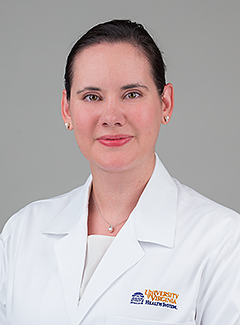
At a Glance
- Assistant Professor, Department of Radiation Oncology
- Specialty: Radiation treatment for patients with breast, gastrointestinal and gynecologic cancers
- Residency: Radiation Oncology, Georgetown University
- Medical Degree: Georgetown University
Radiation oncologist Einsley-Marie Janowski, MD, PhD, is one of many new physician-scientists joining the UVA Cancer Center team. She brings to UVA not only the desire and expertise to help current cancer patients overcome this disease, but also the knowledge and drive to seek new and better treatment alternatives for the future.
What led you to the field of radiation oncology?
When I did a rotation in radiation oncology in my last year of medical school, I found it really powerful and meaningful to help patients with cancer. We’re a part of the trifecta of cancer treatment, including surgical oncology and medical oncology, so we play a big role in helping patients overcome cancer. In addition, we treat many patients palliatively, improving their quality of life and taking away their pain to make them more comfortable. There are also exciting new avenues of research in radiation oncology to improve cancer care, so this seemed like a perfect way for me to combine my interest in research and clinical care.
What is your clinical focus?
I provide radiation treatment for patients with breast, GI and gynecologic malignancies. Specifically, I am interested in the use of intensity-modulated radiation therapy, stereotactic body radiotherapy, gynecologic brachytherapy and intra-operative radiation therapy (IORT) for breast cancer.
Can you explain IORT?
IORT is not new, but this particular method was developed at UVA, so it is different from the one I used during residency. Precision IORT is currently being offered as part of a Phase 2 study at UVA. The goal is to deliver a more meaningful dose of radiation to at-risk areas to achieve better local control, while also being very convenient for the patient, as it’s only one dose of radiation.
The goal for cancer treatments overall seems to be finding a more targeted approach. Does this apply to radiation therapy as well?
Absolutely. We are working to target tumors more effectively, delivering higher doses of radiation to those tumors that are less sensitive to it and focusing the dose so that we’re treating only the tumor and not the surrounding tissue, which limits side effects.
What cancer treatments on the horizon are you most excited about?
One thing that interests me is the use of biomarkers to evaluate treatment response in general. I was involved in a study during residency examining circulating free DNA levels in breast cancer patients before and after chemotherapy. This allowed us to determine if chemo was effective, with the ultimate purpose being to try and identify which patients might benefit from either radiation and/or more chemotherapy. There are a lot of people at UVA interested in similar things, so I hope to initiate biomarker studies for both breast and GI malignancies. Other up-and-coming research includes the use of radiation in combination with immunotherapy agents to activate the immune response. There are a lot of collaborators at UVA working in these areas of research, and I’m interested in joining these teams of research scientists as well.
To refer a patient to UVA Cancer Center, call UVA Physician Direct at 800.552.3723.